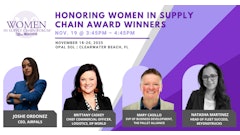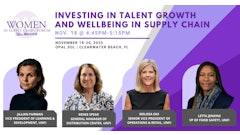
The supply chain is an ever-changing industry full of knowledgeable experts that look to grow in resiliency. But, with so much changing so fast, and now with the Coronavirus disease (COVID-19) pandemic dramatically shifting strategies even more, upskilling and new certifications are important for executives in the field to stay at the front of the field.
The Association for Supply Chain Management (ASCM) is one resource the helps keep executives ahead of the curve and up to date with the right knowledge and resources to effectively manage their supply chains through certification courses.
Supply and Demand Chain Executive spoke with Wesley Warshawer, senior business operations analyst at Lam Research, who recently participated in a certification course through ASCM about the benefits of such a program.
SDCE: Why did you choose to get certified?
Wesley Warshawer: I had recently completed my master’s degree in South Korea through a U.S. State Department award, called the Fulbright Scholarship. I received an excellent education there, but most employers in the United States had never heard of my Korean university. I wanted to show potential employers that I really knew my stuff and becoming Certified in Planning and Inventory Management (CPIM) from the Association for Supply Chain Management (ASCM) really demonstrates that. I had been in the supply chain industry before my master’s, but the body of knowledge is so large that there was still plenty for me to learn.
SDCE: How does this certification with ASCM benefit you?
Warshawer: I think ASCM certifications can help you stand out. There are many talented candidates out there, so showing employers that you have passed this rigorous course can help differentiate yourself. But even after you get the job of your dreams, the coursework helps you step outside your organization and industry to see a bigger picture. Frequently we become so immersed in our particular situation that we fail to step back and see the more macro perspective. The body of knowledge for this certification allows students to study best practices so that they have a perspective outside of their company. It also provides a bigger picture of the supply chain as a whole, not just our specific job role.
SDCE: What is the experience like?
Warshawer: Completing this certification involves studying several learning modules (either by yourself or through classes) and then passing two tests.
SDCE: Has the certification program changed the way you handle certain aspects of your job?
Warshawer: Definitely. I work in the semiconductor industry, so the training I get on the job is semiconductor specific. Sometimes, we can learn new strategies for success by studying other industries or studying content that is industry neutral.
SDCE: How does the certification program differ from traditional schooling?
Warshawer: The curriculum is more focused on real-world applications as compared to many traditional educations. ASCM has decades of experience in the supply chain field, so solutions and concepts are more practical and less theoretical.
SDCE: What advice would you give to others looking to get certified with ASCM?
Warshawer: I would recommend investing the time to really understand the concepts. Once you understand the concepts, you can begin to apply them to your industry, company, and job role. It does take time and work, but it is worth it. Not only will it help you advance in your current role or find your next one, but it will also make you a more knowledgeable and productive employee.
SDCE: Has the COVID-19 pandemic affected your thoughts on upskilling in the supply chain?
Warshawer: When COVID-19 hit, my role went fully remote. As of now, I have been remote for over a year. While we do plan to go back to the office, I had to take my continuing education in my own hands. As technology changes, we have to continue to learn; sometimes you can learn this from colleagues but while we are remote, you must be proactive and find these learning opportunities yourself.
On a more macro scale, COVID-19 has shown vulnerabilities in the world’s supply chain especially in semiconductors. I think a more strategic picture will be needed to lead us in the future.
To get a discount on your next ASCM certification, click here.



![Pros To Know 2026 [color]](https://img.sdcexec.com/mindful/acbm/workspaces/default/uploads/2025/08/prostoknow-2026-color.mduFvhpgMk.png?auto=format%2Ccompress&bg=fff&fill-color=fff&fit=fill&h=100&q=70&w=100)







![Pros To Know 2026 [color]](https://img.sdcexec.com/mindful/acbm/workspaces/default/uploads/2025/08/prostoknow-2026-color.mduFvhpgMk.png?ar=16%3A9&auto=format%2Ccompress&bg=fff&fill-color=fff&fit=fill&h=135&q=70&w=240)








